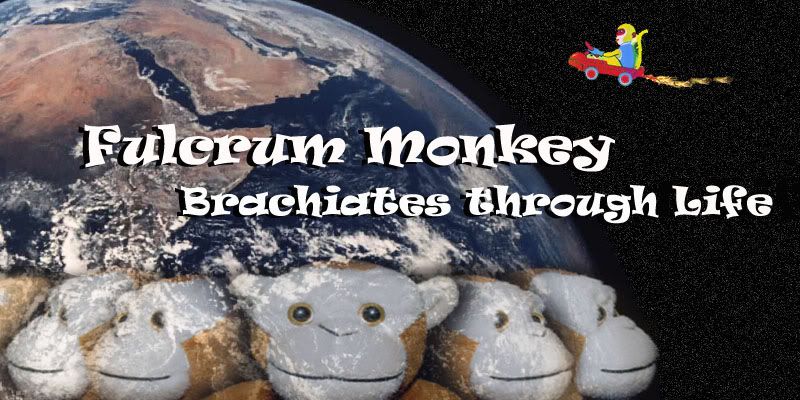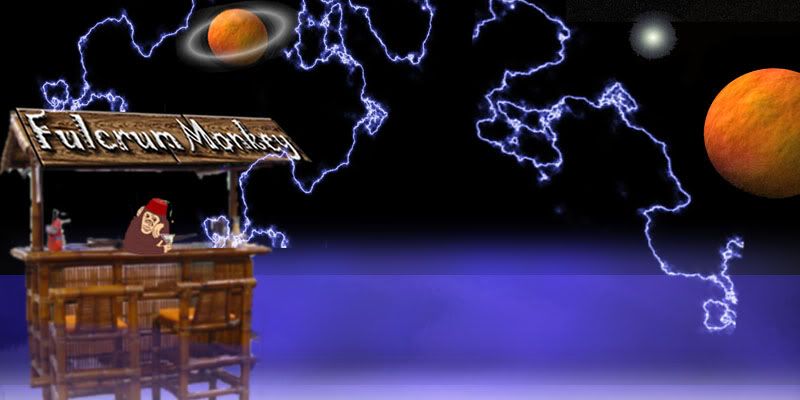Crazy talk:
Changing one’s sleeping schedule is a lot like living with Jet lag – which is the same thing I suppose with an extra blow to your biology from the sudden shift in relation to the sun. I’ve never traveled for a living, but I have done England and back as well as the California and Hawaii turn around and I think that jet lag is an accurate model for my mood swings. I also have not been drinking enough coffee (can one ever?), so as to not be up late, and my addiction to the bean is showing. I am taking a remedy cup of Columbian as I write this.
My to-do list feels like a replicating strand of DNA spiraling off into near infinity. I’ve been doing some procrastinating, which always makes ones list feel worse. Chinese and Roman proverbs about the number of bricks in an edifice or the number of steps in a journey are cold comfort when faced with the prospect of teaching Hawthorn to sophomores. I hate Hawthorn in both topic and style, his tempest in a tea cup plots revolving round the human drain of repression remind me too much of my childhood in the Lutheran Church. On the up side I get to teach two Miller plays and a few short stories of my own selection – which I have yet to pick. That drama (of instruction) starts tomorrow and it’s the little things in preparation, like the need to iron all my shirts, which are driving me nuts.
I’m actually thinking about resuming a meditation practice in order to get my mental house in order. I know you have mixed feelings about the land of the new age, I do as well, but there are some aspects – particularly those of yoga philosophy and practice – that are worth closer scrutiny. The New Age is a millennial buffet of fusion cooking, but the yoga dishes all come from ancient recipes. I like Georg Feurstein’s view of yoga as a spiritual technology that has several thousand years of road testing under its belt.
I suppose I am showing my own Cartesian preferences and materialist leanings in viewing something “spiritual” as a technology – but too often spiritual is used as pass implying beyond logical scrutiny and yoga is anything but beyond logic. Samkhya Philosophy and Vedanta, while esoteric, reach pinnacles of logical thinking on a par with anything in the Western tradition and you won’t find much leap of faith language as virtually all yoga is empiricist in presentation – as in “if you do X you will experience Y”. As I think about that assertion I suppose that a leap of interpretation, if not faith, is an essential component of any explanatory theory of existence – since in the end the total truth may be beyond our capacity to know – or as the Taoists argue beyond language itself. I’ll have to chew on that one for a few lifetimes.
Yoga is a word with many etymological and philosophical attachments but linguists are in some agreement about the nexus of meanings that underlie the more metaphorical associations. Yoga and yoke both have a binding meaning, just as one binds oxen to a cart one uses yoga practice to bind mind and body – the more esoteric meaning would be to bind spirit and matter but there are dualist and non-dualist schools of thought that would argue about the necessity of such a binding when the continued interconnectedness of everything is self apparent (or is it?).
In classical Indian philosophy there are numerous schools of thought on how best to practice, but eight of them have the most mainstream pedigrees and are though of as the eight limbs – or schools - of yoga. If you do yoga to get fit then you are in the Hatha or diamond body tradition. The idea in Hatha is that spiritual practice is physically demanding and if you get the car in good working order you are more likely to make the long spiritual journey to realization without significant breakdown. If you leave off the goal and focus on the car for the car’s sake then you get something most Americans can live with – the bath water with no baby.
Each of the eight limbs are essentially defined by a similar central question of emphasis. Raja, or the royal path, is a good blend of everything if you’re looking for the biggest umbrella under which to weather the storm of your life. I have a friend from the upper crust of a Bombay family who told me that her set views yoga the way we view Arkansas snake handlers: a tad on the cultish side. When it comes to a nexus of attention and action money and class can be religions of their own and sociologically speaking the only real difference between a cult and a religion is popularity.
I am more on a Jnana or wisdom/knowledge based path (when I am being honest with myself about my own philosophical wanderings). There’s a crazy wisdom circle of post-logic logic that I get caught in where one goes left to get right, but I’ve long ago given up on explaining that kind of thinking to anyone. What the hell, I’ll take one stab at it just to give you a taste.
The key problem in Hatha and other forms of yoga (or any Eastern system for that matter) is that of ego. The idea that there is a you that is getting fit and that you are the architect of that fitness will become the biggest impediment to the realization of any spiritual goal that you can imagine, far greater and more perilous than any physical infirmity that you’ve overcome. Any “look how far I’ve come” thinking waters the biggest weed in your garden such that for every step forward you’ve taken ten back. The Taoist answer to this riddle is a concept called Wu Wei or action-less action, where you seek to become aware of universal tides and then go with the flow so your ego don’t grow. My version of that is the very simple philosophy “keep cool but care”.
I think that we see a similar ego debate in Christianity when it comes to the agency of salvation. When Luther emphasized the scriptural assertion that man cannot by his own reason or strength come to know or believe in God and that salvation happens through faith alone created by the working of the Holy Spirit and founded on the substitutionary sacrifice of Christ - he was essentially dealing with an ego/agency problem. He argued that not only does the church in the form of the Papacy lack the keys to heaven, so too the individual lacks those keys. Thinking that you have the keys to heaven is a surefire way not to get there.
This runs counter both to pre-Vatican two Catholicism and most of American Protestantism which takes the line of thinking that Christ “opened the door” but the individual must turn the handle by accepting Christ into their heart or taking some other form of ego based action. Millennial Christianity of the mega-church variety cuts an odd path between asking for forgiveness in a penitent mode of unworthiness and assumptive neo-Calvinism where the nation on the hill has been predestined by God to be both spiritually and materially rewarded. If you want a Jello mold filled with tasty morsels of both ego and hypocrisy rooted in judging your own progress in relation to that of your neighbor, I recommend mega-church.
One of my points, among several, in all of this theological hair splitting is the tapestry point. If the argument is similar even though the context, classical yoga and contemporary Christianity, is widely divergent then perhaps we come closer to truth in looking at the structure of the argument as it manifests in both circumstance. The circumstance is like a tapestry that’s been thrown over the truth and by comparing the structural similarities we avoid getting caught in the historicity of either view.
Unfortunately we then must admit that the apparent structural similarities could be a function of the universality of linguistic structure rather than ultimate truth, hence we give thought to the Taoist assertion that both ego and language are barriers to realization because they are rooted in a fundamental dualism of self vs. world. All the mystical traditions from the Sufi to Martin Buber deny this dualism as the fundamental illusion. This is the thinking that puts me in the crazy wisdom tradition, where it is most logical to be a-logical and you get right by going left. Otherwise I might end up in some sort of dogma tide pool arguing in a self referential system of do and do-not (or have and have not as the materialist version goes).
In all that complexity I still apply Occam ’s razor, that the simplest explanation is often the best. Keep cool but care. Do no Harm. Be of Service. Humor is the best medicine.




0 Comments:
Post a Comment
<< Home